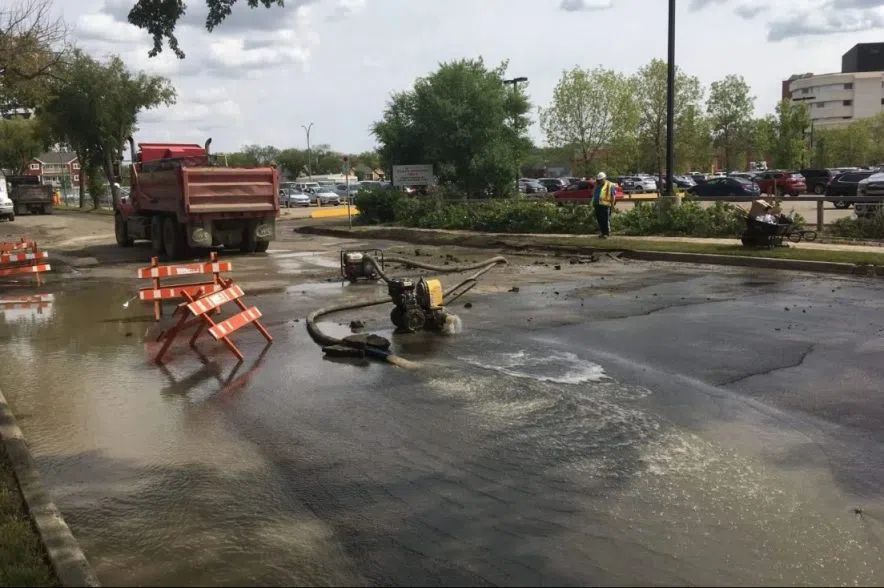A Regina man is advocating for regulations on asbestos cement pipes, something he says could seriously affect people’s health.
Julian Branch recently got back from Ottawa where he and the advocacy group he’s with, Prevent Cancer Now, met last week with Green Party leader Elizabeth May
Together, they claim drinking water that runs through asbestos cement pipes can cause cancer.
“I was there to draw attention and bring awareness to the fact that millions of Canadians are using asbestos cement water pipes on a daily basis,” Branch said.
He said a study by the National Research Council Canada (NRC) found that when the pipes get old, they deteriorate and break, causing asbestos fibres to enter the water.
“Those same studies say that asbestos fibres in the water are a health concern. One 2010 study in particular says they pose a hazard of cancer,” he said.
He said this is concerning for people living in Regina, as close to 600 km of water pipes in the city are made from asbestos cement water pipes.
According to the City of Regina website, it follows Health Canada’s guidelines saying, “Health Canada has concluded that there is no consistent, convincing evidence that asbestos fibers ingested through water are harmful to your health.”
However, Branch said this view is outdated. He believes the federal government should regulate asbestos in water.
“In 1992, the United States of America regulated asbestos in water. That followed 20 years of studies into asbestos ingestion. They decided that, yes, they need to regulate.”
Branch believes it’s time for Canada to do the same.
“The question that nobody seems willing, or able, to answer is how can drinking asbestos cause cancer in Americans and not Canadians? It doesn’t make any sense. So there needs to be some change here,” he said.
Branch also thinks the City of Regina isn’t doing enough to inform citizens about these pipes, especially when they break.
“The asbestos cement water pipe is not like your typical pipe that’s wrapped in asbestos. These pipes actually contain up to 20 percent asbestos, according to the NRC. It’s mixed in with the cement as a binding agent throughout the pipe,” said.
He explained that Regina’s clay soil often expands and contracts, breaking the pipes. Branch said there were almost 2,500 asbestos cement water pipe breaks between 2010 and 2022
“The problem with that is that the City of Regina does not inform residents what type of pipe has broken. So they have no idea that asbestos cement pipes are breaking,” said Branch.
New water lines are currently being installed in the Coronation Park neighbourhood. According to an email from the city, “the construction project in Coronation Park involves the installation of new water lines made from high-density polyethylene, a strong and cost-effective material designed for long-term use in potable water mains.”
Online, the City said, “Asbestos cement has not been used for new water pipes since the 1980s. As asbestos cement pipes break in our shifting soils, and as planned infrastructure upgrades take place, they will be relined or replaced with asbestos-free materials.”
As for concerned Regina citizens, Branch said there are things they can do.
“The first thing they should do is ask their city councilor whether or not they have asbestos cement water pipes delivering water to their home,” he said. “The City of Regina has issued a map showing where the pipes are and it’s quite stark. It’s a stark visual representation of how serious the problem is.”
He said people could look into getting a water filter, reverse osmosis or buying bottled water.
Branch thinks the City should look into replacing asbestos cement pipes as it did with lead ones back in 2022.
“The difference is that lead is regulated in Canadian water, asbestos is not. That’s why we go back to that need for regulation.”
He said he will continue to advocate for change.
“We’re (Prevent Cancer Now) writing to the ministers of health, ministers of environment and we have a parliamentary petition demanding action on this,” he said. “Because it’s not going to go away. The problem with this issue is it will only get worse as the pipes get older. So we’ll continue to raise awareness about this and lobby the federal government for change.











